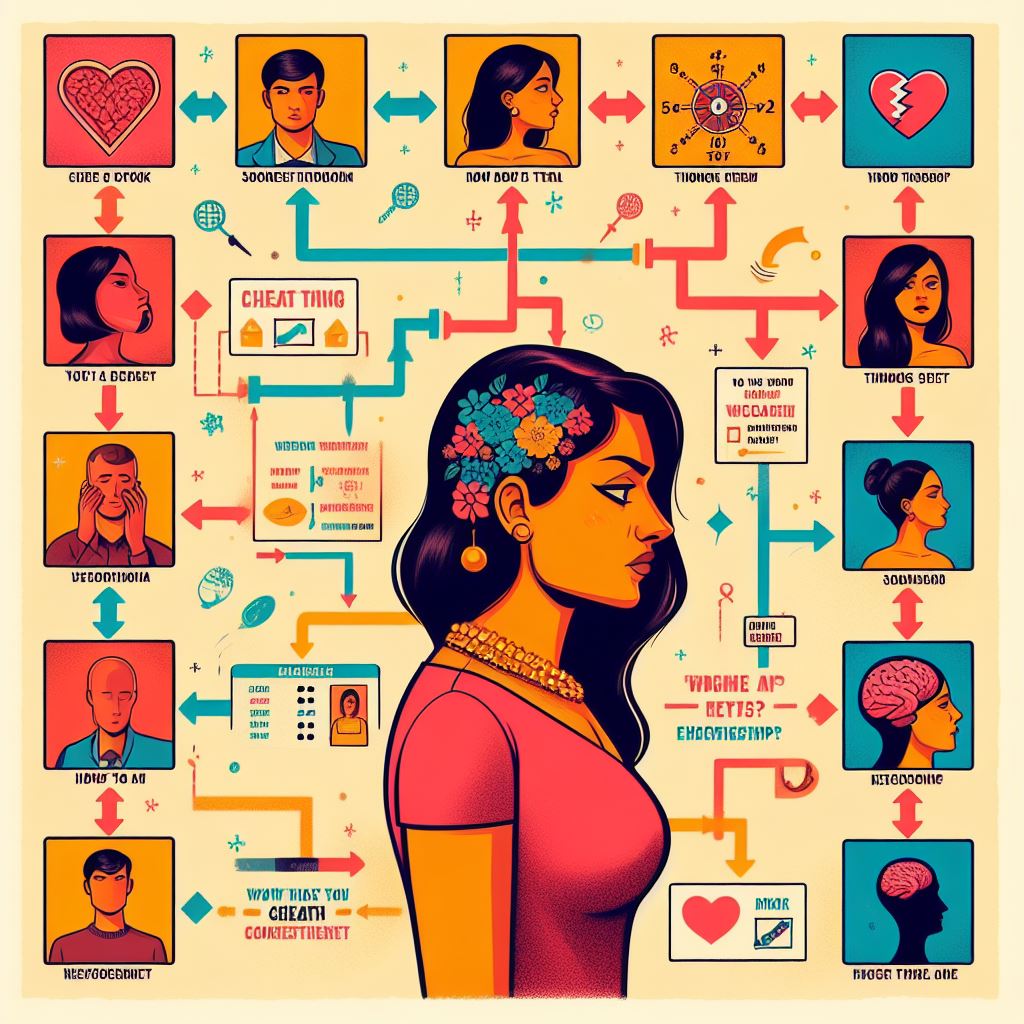When Do Cheaters Realize They Made a Mistake? A Deep Dive into Guilt & Regret
To answer this question, you should know why someone cheats.
Are they blinded by greed or pride?
Are they so self-serving that they’ll cheat and do whatever it takes to satisfy their desires and get what they want.
To decode this we need to understand the science behind cheating.
The psychology of cheating. Why someone cheats?

Several emotional and psychological reasons lead to cheating. But remember, cheating is not inevitable. It’s a choice.
In relationships, lack of attention, unresolved issues, and absence of emotional attachment can make a person cheat.
Sometimes, cheating also relates to psychological problems and cheaters enjoy manipulating people for his/her advantage.
People with low self-esteem often cheat to feel superior and seek validation.
Whatever the reason may be, cheating is always a choice and its realization can be instantaneous or it may occur over a period of time.
How do cheaters feel after cheating?
The immediate aftermath of cheating is excitement and relief. The cheater feels intense emotions of joy after fulfilling his desires.
He’s excited to explore something new. But it doesn’t last long.
Soon after this surge of emotion settles, guilt creeps in. The cheater starts to feel the impact of his actions. He’s remorseful.
This phase after cheating is filled with mixed emotions bring light to the impact of cheating on the cheater as well as the relationship with their partner.
As soon as excitement fades, the cheaters struggle to process their actions and impacts.
They find themselves in utter turmoil and realizations start to creep in.
When do cheaters realize their mistakes?

Cheaters usually realize their mistakes long down the road and at the time of realization, their situation is no different than someone who’s crying over spilled milk.
And when the realization of cheating hits, it hits rock hard.
Also, the consequences of cheating are grave.
In the short term, the cheater experiences guilt and shame and feelings of regret take over the choices they made.
They find themselves deep in remorse for their mistakes and deceiving actions.
While in the long term, the repercussions are even more severe.
Friends and family members abandon them.
Their close ones cease to trust them and their social life is devastated.
Their academic and professional lives also cease to exist and they’ll be kicked out of school and their jobs if their employer catches them red-handed.
Let’s dive in and find out when and how cheaters realize their mistakes…
When they’re caught cheating

When they’re caught red-handed, cheaters experience intense and uncomfortable emotions of shame and guilt.
This is when they realize they’ve made a grave mistake. They feel ashamed when confronted with their actions.
This realization creates an understanding that they’ve hurt their friends or family members makes them regret it.
However, some of them don’t accept their mistakes until they’re faced with some tangible proof and evidence of their cheating acts. When this happens, the cheater realizes they’re no longer an acceptable person.
They witness the impacts of their mistakes on their relationships, their partners have trust issues with them, and they damage the bond they once had with their closed ones.
On top of that, seeing the negative impacts of their actions makes some cheaters guilty and upset that they’ll turn themselves in instantly.
While others may remain unaffected by this and refuse to take responsibility for their actions.
When they’re alone after separation

When loneliness takes over after divorce or separation, it’s a peak time for the cheater to realize their mistakes more acutely.
Being there all alone makes them ponder over their actions and analyze the consequences.
Especially after divorce, the cheaters find themselves single and in some cases burdened by the responsibility of parenting, navigating with their ex-spouse during co-parenting can be very difficult of them.
Also, in these cases, the cheaters realize that their selfishness and the pain they caused their partner has destroyed their marriage and all of this wasn’t worth at all.
The cost they’d paid for a short-lived affair or a new tempting relationship makes them regret over their actions and they find it difficult coming to terms with themselves.
Nevertheless, the ending of their happy marriage and its grave aftermath lead to a sobering and much-needed realization of their mistakes.
When cheating leads to a bad relationship

Now, this comes as a stark realization.
When cheaters enter a new, apparently promising, but actually a bad relationship they realize their mistakes.
Their new partner usually knows that they were cheating with them on their last partner so they’re often labeled as ‘cheaters’ and now caught in this relationship, they’ve to face the consequences of their actions.
Cheaters often think that they can get away with their cheating after a fresh start.
But that’s never the case, the repercussions of their initial infidelity are long-lasting.
Their actions damage the new relationship too and they always have to face trust issues.
Moreover, the cheaters find it difficult to move on from their previous relationship when they realize that this new partner is not as forgiving and understanding as the previous partner they cheated with.
They find themselves deep in guilt and keep thinking about the life they had with their last partner.
This guilt makes it difficult for them to fully commit to the new relationship and remorse sets in.
In these circumstances, cheaters are hit by the hard realization that by engaging in such destructive behavior they’ve not only inflicted pain upon their partners but also on themselves
What factors lead to the realization of cheating?
Several factors pave the way for realization to settle in. This can be the severity of cheating, its impact on the relationship, and the response of the partner.
Let’s find out how these factors affect the cheater and make them realize their mistakes.
- Severity of cheating
- Response of partner
- Friends & Family
- Personal standards
- Time is the biggest teacher
Severity of cheating
The severity of cheating and its impact on the relationship determines how the cheater will respond to being caught in the act.
Cheating can be emotional and physical and its severity determines the partner’s reaction and damage caused.
Physical cheating, indulging in sexual activity and romantic relationships with someone else other than your partner – is a grave mistake. It can cause irreversible damage to the relationship.
By having a sexual relationship with another person, the cheater inflicts great pain on their partner.
If the cheaters acknowledge the pain and suffering of their partners they’re more likely to realize the gravity of their mistakes and take steps to ameliorate the situation.
However, in the case of emotional infidelity, it can be hard for the cheaters to realize their mistakes. Because of their emotional involvement with someone else and they’re not ready to accept that this emotional involvement is a mistake.
Partner’s response
Partner’s reaction can play a significant role in making the cheaters realize their mistakes.
If the partner reacts with anger and abandons the cheater they’re less likely to realize that cheating was a mistake and they’ll stick with their decisions.
Nevertheless, if the partner tries to talk it out and show forgiving behavior, the cheater will accept his mistakes and will be more than ready to work towards improving things.
Friends & Family
Cheaters often cheat to seek external validation from friends and family members that they have the power to manipulate people and get what they want.
At the same time, cheaters also fear isolation and abandonment.
If friends and family condemn the cheater’s actions and abandon them, they’ll realize the severity of their mistakes and will try to make amends.
Also if the feedback from friends and family is harsh enough the cheater will feel extreme guilt and regret.
This will push them to seek forgiveness for hurting others and refrain from cheating in the future as well.
Personal standards & values
Everyone has personal standards and values, be it the cheater.
While choosing a partner and being in a relationship, cheaters – like many others – prefer honesty and sincerity.
They advocate treating partners with respect and dignity and being transparent in relationships.
And when their actions go against their values, they’re instantly shadowed by deep guilt and shame.
Having these double standards makes it difficult for them to look themselves in the eye.
This motivates them to improve themselves, realize their mistakes in a short time or almost instantly after the incident and take steps to improve their behavior and character.
Time is the biggest teacher
They say there’s no better teacher than ‘Time’ and it’s true without a doubt.
As time passes, the once excited and heightened emotions start to settle. The rational brain becomes active and the cheater starts to see their mistakes.
For instance, immediately after cheating on their partner and having a romantic relationship with another person feel adventurous and exciting to them.
The new relationship appeals so much that they’re blinded by the charm and spark of emotions.
If they’re confronted at this stage, they’re less likely to accept their mistakes and will defend their acts.
But as time passes, and emotional fireworks come to a halt, the severity of the situation becomes crystal clear and they are overpowered by regret, guilt, and shame.
They even curse themselves for cheating and realize that their actions caused pain not only to their partner but also to them.
From Denial to Regret: When Cheaters Wake Up to Their Mistake
From denial to regret, the journey of self-awareness for cheaters is marked by a complex interplay of emotions and realizations.
The period of this transformation varies from weeks, months, or even years after the initial mistake was made.
Remorse and regret often emerge as significant waypoints along this path, each fueled by the realization of the gravity of their actions.
One crucial factor that nudges cheaters towards this awakening is the reaction of their partner.
The partner’s emotional response, whether it’s laced with anger, hurt, or a desire to mend the relationship, becomes a catalyst for change.
It ignites a process where the cheater confronts the reality of their behavior and starts navigating the realms of understanding and forgiveness.
The impact of their actions begins to resonate deeply, as the cheater steps out of the bubble of denial.
This moment of clarity brings the reality of their mistake into sharp focus. As the realization sets in, the cheater’s behavior transforms, reflecting a shift from avoidance to responsibility.
Emotional maturity and empathy play pivotal roles in this transformation.
Individuals who possess these traits often find themselves traversing this path more swiftly.
Empathy, in particular, bridges the gap between denial and regret, allowing the cheater to fully grasp the impact of their actions on their partner and the relationship.
How to Move Forward After Cheating?
Moving forward after experiencing the challenges of cheating requires a thoughtful and intentional process.
The initial step in this journey is to genuinely acknowledge the mistakes that were made. Taking responsibility for one’s actions is crucial, as it lays the groundwork for the road ahead.
Each choice made during the process of cheating has repercussions, causing hurt and pain. Recognizing this pain is essential to begin the process of healing.
An important aspect of moving forward involves openly addressing the situation.
Having honest conversations about the behavior that led to cheating is a pivotal step.
Apologizing for the hurt caused is not merely an act of remorse, but a bridge towards understanding and reconciliation.
This apology should be heartfelt and sincere, demonstrating a commitment to repairing the relationship.
Rebuilding trust, once shattered, is a delicate process.
It requires patience, dedication, and consistent effort.
The commitment to change and the promise to never repeat the same mistakes are integral to this phase.
Working on oneself is key; this involves reflecting on the poor decisions that led to the actions and focusing on self-improvement.
Moving forward doesn’t mean forgetting the past; instead, it entails embracing a new future.
The focus should be on building a healthier and stronger relationship, one that has learned from its mistakes and is committed to a better tomorrow.
Conclusion
In conclusion, the journey of a cheater is marked by a series of emotions and realizations.
From the initial choice to cheat, the subsequent feelings of guilt and shame, the eventual realization of the mistake, and the enduring consequences that touch every facet of life – all serve as a reminder that actions, whether in the short or long term, have profound repercussions that go beyond the immediate gain.
And moving forward after cheating is quite challenging. Easier said than done.
The journey is time-consuming, as wounds need to heal and trust needs to be rebuilt.


